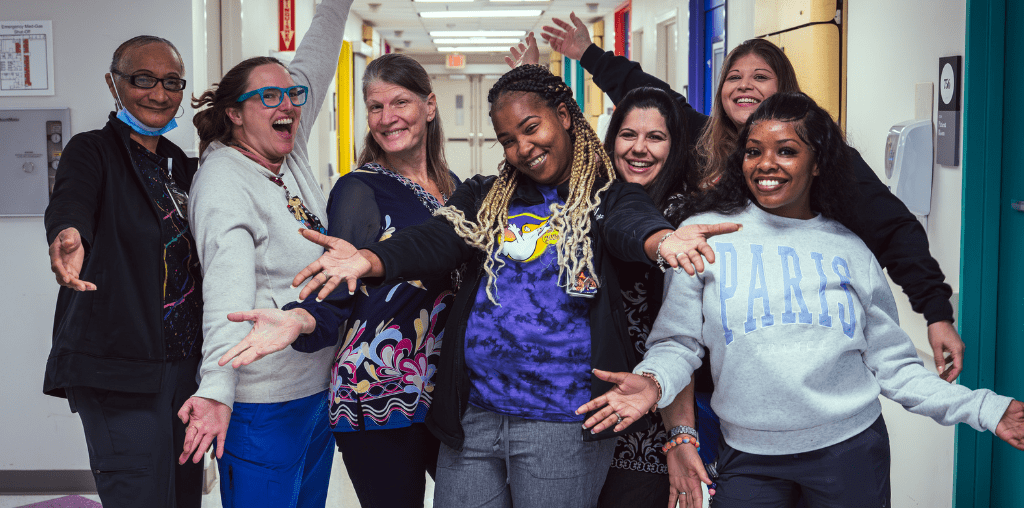Psych Tech LaTasha Hawks and Texas Children’s Behavioral Health Support Team are Changing Lives
At Texas Children’s Hospital, caring for the whole child means nurturing both their physical and emotional health. As the need for behavioral health services has grown, so has our commitment to meeting it with compassion and expertise. Our Behavioral Health Support Team was created to ensure that children and adolescents with behavioral challenges or in crisis receive the thoughtful, specialized care they need. Every day, this team stands alongside our staff, providing support and guidance as we face the growing challenge of mental health issues in our young patients.
One of the key members of our Behavioral Health Support Team is LaTasha Hawks, a psychiatric technician (psych tech) who has been with Texas Children’s since 2022. LaTasha brings not only her professional expertise but also her personal experience and empathy as a mother. Her passion for helping children and her keen observational skills have made her an invaluable part of our Behavioral Health Support Team, and her story is a testament to the dedication of all those who work in this challenging but deeply rewarding field.
From Geriatric to Pediatric Patients
Before joining Texas Children’s, LaTasha was a CNA at a Houston-area community hospital when she transitioned to a role in the geriatric department as a psychiatric technician. She found working with older adults fulfilling, treating her patients with the same care and compassion she would offer her own loved ones. “I loved it,” she shares. “I wanted to help the older generation to make sure they were cared for.”
However, personal experiences with her son’s mental health challenges led LaTasha to shift her focus toward working with younger patients and join our team at Texas Children’s. “I wanted to better understand him and kids with behavioral and mental health disorders,” she says. “Working with children at Texas Children’s has given me the opportunity to learn more, especially about conditions like autism, which I hadn’t experienced before.”
A Typical Day in the Life of a Psych Tech
LaTasha’s role as a psych tech involves working directly with children who are non-verbal, exhibiting aggression, suicidal ideation or other behavioral challenges. “Every day is different,” LaTasha explains. “Some days we get the same patients, other days it’s new faces, new challenges. I love learning about each patient and figuring out how best to support them.”
Her job requires her to be flexible, empathetic, and observant—skills that are crucial when working with children who may have mental health conditions, developmental disorders or trauma-related issues. “You never know which patient you’re going to get,” she says. “It’s a challenge, but that’s what makes the job so rewarding.”
LaTasha often helps calm tense situations, providing emotional support and working alongside a multidisciplinary team that includes nurses, social workers and care coordinators. Her ability to connect with patients and her attention to detail has made a difference in the lives of many children at Texas Children’s.

The Qualities of a Great Psych Tech
Being a successful psych tech requires a unique set of qualities. Empathy, patience and a strong sense of observation are critical. Behavioral Health Manager Gricelda Ron explains, “Great therapeutic communication is key. You want to build rapport with your patients so they can open up to you about what’s going on in their lives. That trust allows us to treat the problem, not just treat the symptoms.”
LaTasha’s ability to be fully present and connect with patients with compassion and attentiveness helps her build that crucial trust. She emphasizes that being a psych tech requires a genuine desire to care for others. Illustrating why, Gricelda adds, “These kids are going through something real and often very scary. Even though we may not see or hear what they’re experiencing, we need to listen and respond with care.”
Kristine Murray, Assistant Clinical Director of Acute Inpatient Behavioral Health, points out, “LaTasha is a shining example of what it means to be a great psych tech. She’s mindful of her surroundings, empathetic to the struggles her patients face, and she pays attention to the smallest details.”
The Power of Observation: A Life-Saving Intervention
These traits were put to the test in a moment that LaTasha still reflects on today. She gets emotional as she recalls how she prevented a young patient from returning to a potentially abusive environment. The patient was about to be discharged from the hospital, but LaTasha’s instincts told her something wasn’t right about behavior she observed between the patient and a member of their household. Trusting her gut, she raised her concerns with her team, prompting further investigation.
“I’m a mom, so I pay attention to details,” LaTasha says. “Some people might have overlooked what was happening, but I just couldn’t shake the feeling that something was wrong.” Her quick action prevented the child from being discharged into a potentially dangerous situation. Thanks to LaTasha’s keen observation and willingness to speak up, the team was able to intervene, ensuring the child’s safety.
LaTasha was awarded our Shamrock Award, a recognition given to staff who go above and beyond in their care for patients. “I didn’t even realize I was saving a life at the time,” LaTasha recalls. “I was just doing what I thought was right, and I had an amazing support team that helped me through it.”
Finding Balance: The Importance of Self-Care
Working in behavioral health can be emotionally demanding, but LaTasha credits her team with providing the support needed to manage those challenges. “I have an amazing team. Even at 2 a.m., if I call our ACD Kristine, she’s there. That support is everything.”
To stay grounded, LaTasha makes sure to take time for herself, often by indulging in her favorite activity—cruising. “Cruising is my way to decompress. I don’t have to worry about phones, bills or anything else. It’s just me, the ocean and some time away to reset,” she explains. Whether it’s a quick trip to the beach or a cruise across the sea, LaTasha believes in the importance of finding balance in life.
The Role of the Behavioral Health Support Team
The Behavioral Health Support Team at Texas Children’s was created in response to a drastic increase in the number of patients presenting with behavioral health concerns. “Behavioral health numbers have skyrocketed in Texas since 2020. Our team went from seeing around 50 patients a month to now managing 500 to 600 patients every month,” says Kristine.
The team serves as a critical resource for the entire hospital, offering support and guidance to staff who may not have experience handling behavioral health cases. “Our team functions as a mobile unit across the hospital,” says Kristine. “We don’t have a specific space for behavioral health patients, so we’re called in whenever they’re admitted to ensure their safety and help the staff navigate those challenging situations.”
Psych techs like LaTasha are at the heart of this effort, working closely with patients so they feel heard, understood, and cared for.
“Every day I come to work, I think about how I want to be there for these kids the way I would want someone to be there for my own child. These kids need someone who truly cares, who’s paying attention. Whether it’s braiding hair or playing Uno with a child who feels lonely, I’m proud to be that person, and I’m grateful that Texas Children’s has given me the opportunity to make a difference in their lives.”
Join Our Team
LaTasha’s story is just one example of the incredible impact you can have on the lives of our patients at Texas Children’s in a truly meaningful career. We are always looking for compassionate, dedicated individuals to join our One Amazing Team. If you’re passionate about helping children and families, we encourage you to explore ways you can Be the Difference and apply today.





